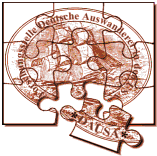 |
10 Pitfalls in "Germans to America"
Wilmington, DE: Scholarly Resources 1989-2000 (1850-1895) |
These publications of passenger lists omit some details:
122 vessels which left European ports for New York in
the period 10 July – 9 October 1851 (3 months) and carried ca. 25,000 German
passengers are disregarded;
|
In these editions the names of Germans in passenger
lists are frequently overloooked
particularly if these names appeare singly among Non-German names. In these editions cities are frequently identified
with the wrong German regional state
In the book edition those places of origin that are not indicated in the original lists, and frequently also places that are indicated in the lists are coded as 'unknown places' (000; ZZZ). In both cases the same codings are used so that even on the CD and in the DAD in to many cases, the places of origin given in the original lists are not indicated. For this reason many users of this edition get the impression
that no place of origin is given in the original list for the name of the
person they are tracing.(This error is easy to identify in the book edition
in lists which include codings for places as well as '000' and 'ZZZ' codings.
However, there are also lists presented in the edition which Glazier/Filby
have deprived of all places of origin).
|
Anyone seeking information should match any information given in 'Germans to America' against the originals stored on microfilms in the National Archives in Washington, D.C.. Even if no information was found in 'Germans to America' the indices and the lists on microfilms should be checked. The microfilms are available e.g. in Washington D.C. and in Fort Wayne/Indiana, in Salt Lake City and – for the years 1820-1897 – in the library of Oldenburg University/Germany (http://www.dausa.de, click the American/British flag and „passenger lists“). At this Internet site the pitfalls in 'Germans to America' are presented as well (Buchedition/2CD/DAD).
(Antonius Holtmann, Universität, 26111 Oldenburg,
Tel.: +49(0)441-798-2614/3059, Fax: +49(0)441-798-5180,
E-Mail: dausa@uni-oldenburg.de;
Internet: http://www.dausa.de)